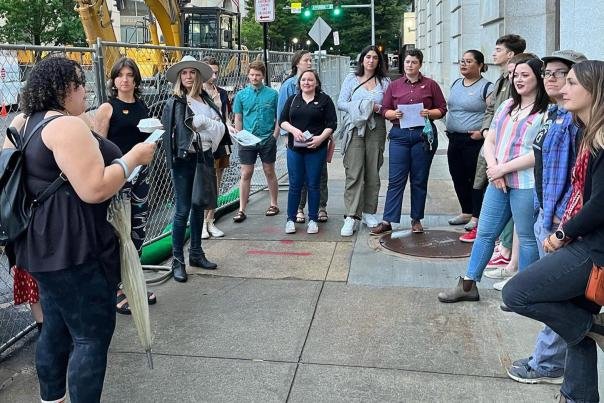In the ever-evolving landscape of queer history, one name stands out – Samantha Rosenthal. Through her captivating storytelling, Rosenthal brings to life the hidden tales and untold stories of Virginia’s queer past. In this blog post, we explore the importance of storytelling in preserving and celebrating LGBTQ+ history.
Samantha Rosenthal is not just a storyteller; she is a historian, an advocate, and a voice for those whose stories have been silenced for too long. With a passion for uncovering the truth, she dives deep into the archives, unearthing documents and photographs that paint a vivid picture of a time long gone. But it’s not just about the facts and figures; it’s about the people behind those statistics. Rosenthal brings them to life, giving them a voice and a face.
One of the most powerful aspects of Rosenthal’s work is the way she connects the past to the present. By sharing the stories of queer individuals from Virginia‘s past, she shows us that their struggles, their triumphs, and their lives are not so different from our own. These stories serve as a reminder that we are part of a continuum, that the fight for equality is ongoing, and that we stand on the shoulders of those who came before us.
But storytelling is not only about looking back; it’s also about looking forward. By highlighting the queer past, Rosenthal creates a space for dialogue and understanding. She encourages us to think about the future, to imagine a world where everyone is accepted for who they are, regardless of their sexual orientation or gender identity. Through her work, she plants the seeds of change, inspiring the next generation of activists and advocates.
Storytelling also has the power to challenge preconceived notions and break down barriers. When we hear the stories of queer individuals who defied societal norms and expectations, it reminds us that we too can be agents of change. These stories show us that queer history is not just a footnote in the larger narrative of society; it is an integral part of it.
In addition to challenging stereotypes, storytelling also helps to build community. When we share our stories, we find common ground and connect with one another. We realize that we are not alone in our experiences, and that there is a collective strength in our shared history. This sense of community is crucial, especially in a world that often feels divided.
Samantha Rosenthal’s work is not limited to the pages of a book or the stage. She also engages with communities, facilitating workshops and discussions that encourage people to share their own stories. This interactive approach allows for a deeper understanding of the queer experience and fosters a sense of empowerment among those who have often beenmarginalized.
As we look to the future, it is essential that we continue to tell these stories. We must ensure that the queer past is not forgotten, that the lessons it teaches are carried forward. By doing so, we can create a more inclusive and just society, one where everyone’s story is valued and celebrated.
In conclusion, Virginia’s queer past comes alive through the storytelling of Samantha Rosenthal. Her work is a testament to the power of words and the importance of giving voice to those who have been silenced. Let us continue to learn from the past, celebrate the present, and work towards a future where everyone’s story is heard. Because when we tell our stories, we shape the world around us.




